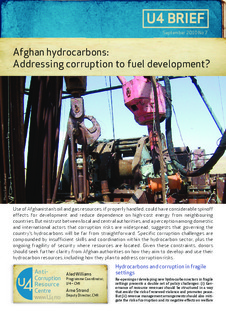| dc.contributor.author | Strand, Arne | |
| dc.contributor.author | Williams, Aled | |
| dc.date.accessioned | 2018-01-04T08:16:31Z | |
| dc.date.available | 2018-01-04T08:16:31Z | |
| dc.date.issued | 2010-09-15 | |
| dc.identifier | oai:www.cmi.no:3787 | |
| dc.identifier.citation | Bergen: Chr. Michelsen Institute (U4 Brief 2010 No 7) 4 p. | |
| dc.identifier.uri | http://hdl.handle.net/11250/2474640 | |
| dc.description.abstract | Use of Afghanistan’s oil and gas resources, if properly handled, could have considerable spinoff effects for development and reduce dependence on high-cost energy from neighbouring countries. But mistrust between local and central authorities, and a perception among domestic and international actors that corruption risks are widespread, suggests that governing the country’s hydrocarbons will be far from straightforward. Specific corruption challenges are compounded by insufficient skills and coordination within the hydrocarbon sector, plus the ongoing fragility of security where resources are located. Given these constraints, donors should seek further clarity from Afghan authorities on how they aim to develop and use their hydrocarbon resources, including how they plan to address corruption risks. | |
| dc.language.iso | eng | |
| dc.publisher | Chr. Michelsen Institute | |
| dc.relation | U4 Brief | |
| dc.relation | 2010 No 7 | |
| dc.relation.ispartof | U4 Brief | |
| dc.relation.ispartofseries | U4 Brief 2010 No 7 | |
| dc.relation.uri | https://www.cmi.no/publications/3787-afghan-hydrocarbons | |
| dc.subject | Natural Resource Management | |
| dc.subject | Fragile States | |
| dc.subject | Afghanistan | |
| dc.title | Afghan hydrocarbons: Addressing corruption to fuel development? | |
| dc.type | Report | |
